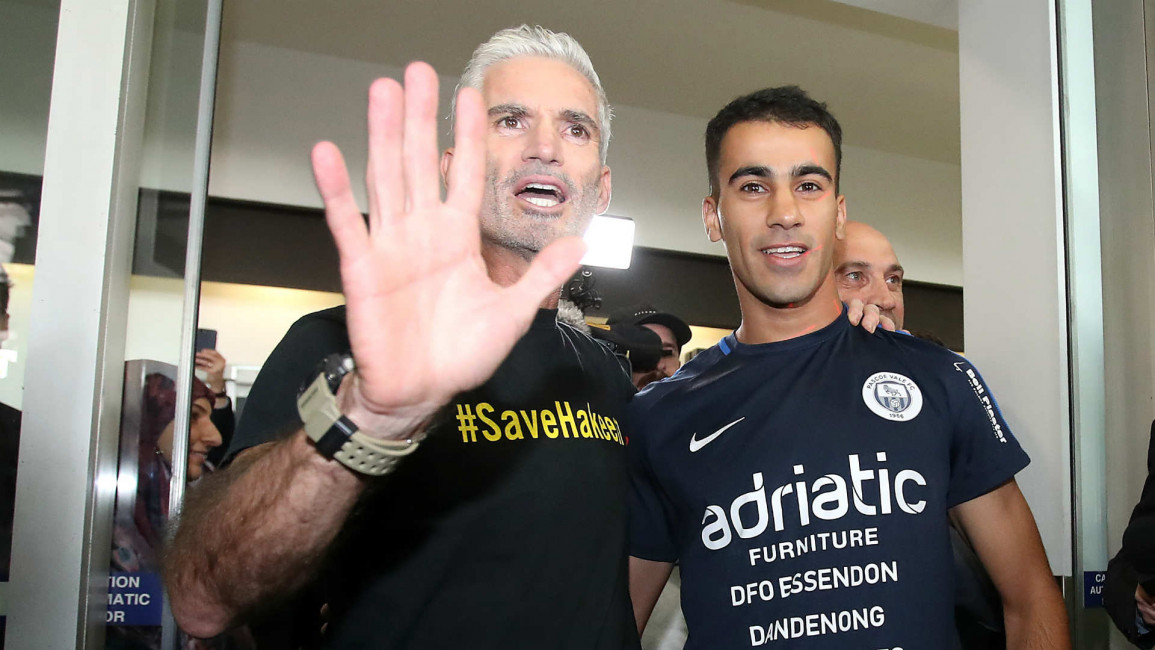'This is my country': Refugee-footballer Hakeem al-Araibi thanks Australia for saving him from Bahraini regime
Bahraini refugee footballer Hakeem al-Araibi made a triumphant return to Australia on Tuesday following a sudden decision to cancel his extradition to Bahrain, where he is wanted for political dissent.
"I want to thank Australia. This is my country", Araibi told crowds of well wishers gathered in Melbourne airport on Tuesday, AFP reported.
"I don't have citizenship yet, but my country is Australia. I will die in Australia and I love Australia."
The supporters gathered to greet Araibi wore #SAVEHAKEEM t-shirts, a nod to the Twitter hashtag with which human rights advocates and others across the world campaigned for his safe return to Australia, and sang the popular football anthem "You'll never walk alone".
A Thai court approved the attorney general's request to release Araibi on Monday after the footballer spent more than two months in prison.
|
|
Thailand arrested Araibi when he came to the country for his honeymoon in November. The arrest was prompted by an Interpol red notice issued by the footballer’s home country Bahrain, where he stands accused of vandalising a police station, a charge he denies and says is politically motivated on the back of his criticism of regime figures.
The footballer traveled to Australia in 2014 fleeing political persecution. Before his release, Araibi pleaded with the Thai courts not to deport him to Bahrain, where he feared he could be tortured.
Bahrain abruptly requested Thailand drop extradition proceedings against Araibi on Monday, following months of the country urging his deportation.
"We have been informed that Bahrain wants to withdraw the request", Chatchom Akapin, a director-general in the Thai prosecutor’s office told AFP. "If they don't want him, we have no reason to keep him here."
A statement given by Bahrain's foreign ministry on Monday did not confirm the country had requested extradition procedures be dropped. The foreign ministry said Araibi’s guilty verdict "remains in place", reaffirming its "right to pursue all necessary legal actions" against the footballer.
|
|
"We know all Australians will deeply appreciate the decision, allowing him to return to his wife, family and friends", stated Australian Prime Minister Scott Morrison.
Former Australian football captain Craig Foster, who led a prominent social media campaign to release Araibi, thanked the Thai government and its people for his release.
"Two moments captured the world's attention this month: the photo of footballer Hakeem al-Araibi shackled and barefoot, and the moment of Hakeem breaking the chains and reunited with his beloved wife, friends and the football community in Melbourne", Bahraini human rights activist Sayed Ahmed Alwadaei told AFP.
The Bahrain Institute for Human Rights and Democracy advocate, who fled political repression in Bahrain, said the case had bought much-needed attention to the plight of detainees in Bahrain.
The decision contrasts with both Australia and Thailand's recent dealings with asylum claimants. Australia was accused of turning back Saudi women traveling to the country alone on February 4. Thai authorities considered deporting Rahaf al-Qanun, a Saudi woman who fled to Thailand in January en route to claim asylum in Australia, before she was given refuge in Canada.



